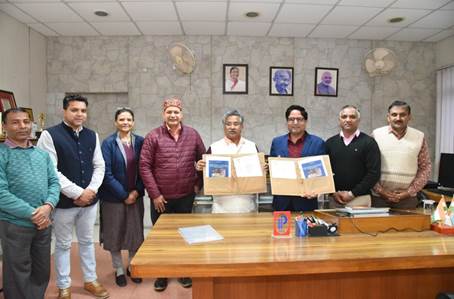New Delhi: In a significant move towards sustainable energy solutions and environmental conservation, an MoU was signed on March 5th between CSIR-Indian Institute of Petroleum, Dehradun, and UCOST under the “Adarsh Champawat” mission. The initiative, guided by the Chief Minister Pushkar Singh Dhami, aims to deploy technology for fuel production from Pine Needles in Champawat.
The MoU, signed by Dr. Harendra Singh Bisht, Director of the Indian Institute of Petroleum, and Professor Durgesh Pant, Director General of UCOST, outlines the implementation of two crucial technologies at the grassroots level in Champawat. The selected technologies include a briquetting unit with a capacity of 50 kg per hour based on Pine Needles and 500 units of Improved Cookstoves for rural households. A field trial study will be conducted to assess energy conservation and its environmental impact.
The briquetting unit, a part of the Women Empowerment initiative, will be established in the Energy Park in Champawat. The produced briquettes will serve as fuel in homes and local industries, offering an eco-friendly alternative.
Dr. Harendra Singh Bisht highlighted the importance of managing Pine Needles to reduce forest fires. The Pine Needle briquettes and pellets developed by the Indian Institute of Petroleum can replace coal, providing an environmentally friendly fuel source. These briquettes find application in domestic cooking, as well as direct or co-firing fuel in brick kilns and thermal power plants.
The biomass cookstove, designed to work with Pine Needle briquettes, boasts an energy efficiency of 35% and reduces household pollution by 70%. The CSIR-Indian Institute of Petroleum, designated to certify biomass pellets for thermal power plants, plays a pivotal role in advancing biomass utilization.
Professor Durgesh Pant, acknowledging the guidance of the Chief Minister, emphasized the business opportunities presented by Pine Needle collection, value addition, and supply to the industry in Champawat. He sees the project as a means to create regular employment opportunities and income sources for the rural population. Pine Needle briquetting, with proper training, could evolve into a thriving sector.
Pankaj Arya, lead project Scientist, emphasized the holistic approach towards sustainable development in Champawat. The project aims to promote rural entrepreneurship, provide training and skill development, and create market linkages. Over 100 beneficiaries/stakeholders will receive training, generating new employment opportunities. The initiative also includes workshops, exhibitions, and distance learning methods to foster scientific temperament and skill development among local women and youth.





